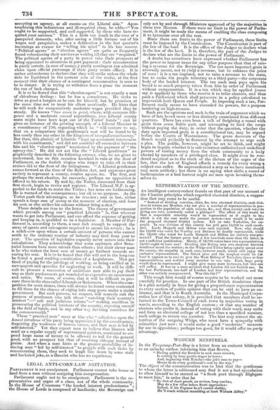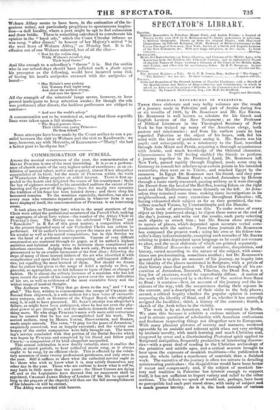WOBURN MINSTRELS.
IN the Twopenny-Post-Bag is a letter from an eminent bibliopole to an unlucky author, informing him that SCOTT,
" Having quitted the Borders to seek more renown, Is coming by long quarto stages to town ;
And, beginning with Rokeby—the job's sure to pay—
Means to do every gentleman's seat by the way."
The object of the communication was to hint that the gentleman to whom the letter is addressed may find it not a bad speculation to allow himself to be started as " a fresh poet through Highgate to meet him," in order that he
" By dint of short proofs, no revises, long coaches, May do a few villas before Scott approaches : Indeed, if his Pegasus be n't cursed shabby, He'll reach without stumbling at least Woburn Abbey."
'Woburn Abbey seems to have been, in the estimation of the in- genious writer, not particularly propitious to spontaneous inspira- tion—a dull locality, where a poet might be apt to feel exhaustion and draw bridle. There is something calculated to corroborate his opinion in the " loyal ode," which the Court Circular informs us was sung, " after dinner," in honour of her Majesty's arrival " in the west front of Woburn Abbey," on Monday last. It is the effusion not of one Woburn minstrel, but of all the clan- " Now let the welkin ring
While Woburn's minstrels sing Their loyal theme."
And like enough to a schoolboy's " theme" it is. But the urchin tvho in our school-days should have inflicted such a finale upon his preceptor as the following, would have incurred some risk of having his head's antipodes crowned with the antipodes of laurel-
" May Britain's sons prolong Our Woburn Park night-song, And shout the anthem strong, God save the Queen."
All the strength of the minstrels' lungs seems, however, to have proved inadequate to keep attention awake ; for though the ode was performed after dinner, the luckless performers are obliged to confess-
" And now the world's asleep."
A consummation not to be wondered at, seeing that these soporific lines were taken upon a full stomach-
" The Royal parents bless, Their child—our young Princess—
Do thou defend."
Some attempts have been made by the Court scribes to run a pa- rallel between the visit to Woburn and the visit to Kenilworth : we may, however, say with Merentio, of ELIZABETH—"Marry! she had a better poet to be-rhyme her."



























 Previous page
Previous page